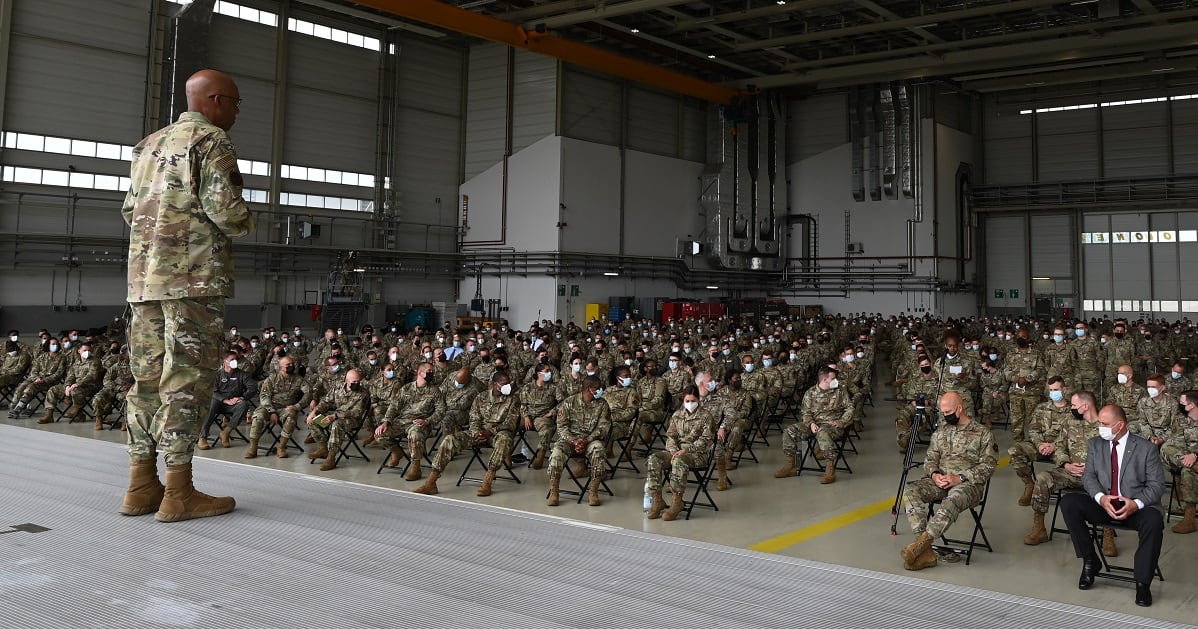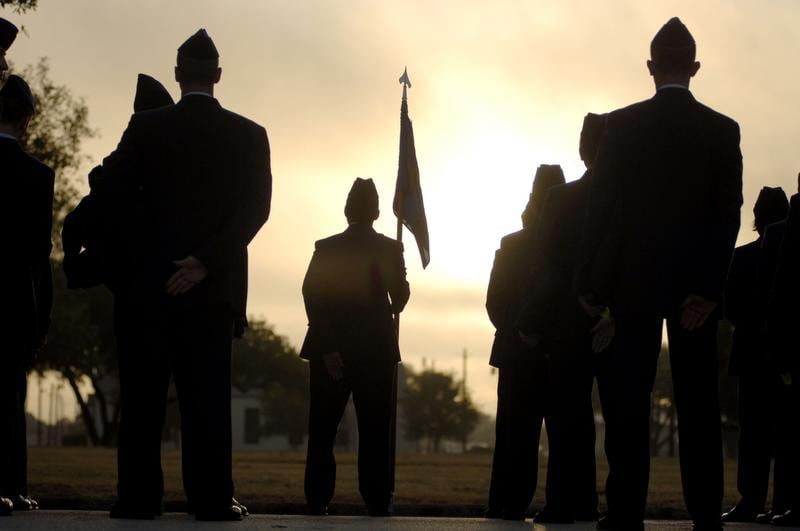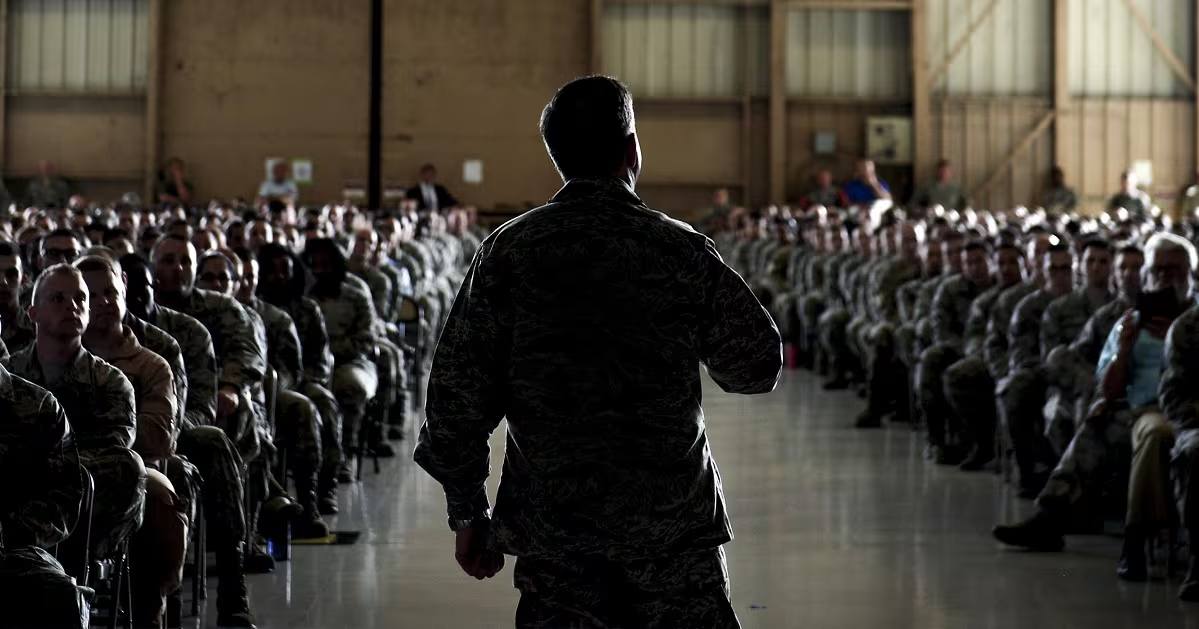I appreciate Maj. Kevin Rossillon’s recent column suggesting a return to early officer promotions. However, I feel compelled to offer a dissenting view.
RELATED

My main issue with the opinion piece is that it fails to seriously grapple with the points that Col. Jason Lamb has argued in his essays. In fact, the author states that he does not reject them and even agrees with many of Col. Lamb’s points as valid, though that’s all we’re told. So, we’re left as readers to fill in the blanks with assumptions and searching for implied facts, material for which the article is ripe.
I wish Maj. Rossillon had more directly engaged with Col. Lamb’s ideas so we can understand as readers why he thinks we should discard them in favor of a return to early promotions. In the absence of this, I felt obliged to map out his thinking with some assumptions about his reasoning. I recognize that in doing this I may have erred in my interpretation and look forward to a response, should it be warranted.
RELATED

Maj. Rossillon presents us with two main points of contention. First, that the system as it is now will cause a brain drain of talent, seemingly because of dissatisfied “high caliber” officers who are too eager to follow a standard career progression. To support this point, the author ebbs and flows between studies highlighting competitive compensation as a main concern while adding that it’s more about a feeling of being underutilized and not related to monetary compensation. He readily admits the anecdotal nature of his own data, and I appreciate that self-awareness, but the author claims this anecdotal evidence is connected to the cited research, for which there is no reference provided.
I’m afraid there are no connecting threads here. Even if the argument was thematically cogent, the anecdotal evidence is based on an extreme demographic cohort of self-selected, academically and professionally homogenous respondents to casual conversation, suggesting a very particular echo chamber that defines “high caliber” in a very narrow academic sense.
There’s also a claim that “young officers frequently decide whether to continue serving in the Air Force based on their projected roles and responsibilities, which are largely driven by rank and recognition.” This is a packed claim that is notably devoid of any empirical reference and that disregards external job market conditions, satisfaction with base assignments, individual experiences of discrimination or workplace harassment, or any other number of major factors which have been empirically documented.
To further complicate the discussion, early promotions were done away with at a similar time that officers started considering their options under the new Blended Retirement System, which offered a more appealing option of walking away early from military service. Thus, any linear claim about career decisions that disregards these nuances does not stand on the weight of its own logic.
The second point in the article is that the current setup incentivizes risk-averse behavior. With promotion rates as high as they are, most officers may feel, as the argument goes, like they can simply cruise into field grade ranks, and this denies the Air Force the kind of innovative leadership that is needed today. We’re again left with some material to weave out implications. But the first thing I will note is that this in no way describes the vast majority of Air Force officers that I’ve had the privilege to serve with, and to characterize the officer corps as conformist is a harsh claim that is, from my anecdotal observations, unsubstantiated, if not outright irresponsible.
I think it’s also important to point out the implication here that not promoting at an accelerated rate, thus spending more time in grade, is akin to stagnation. I just don’t understand, and the article certainly does not justify, the impulse to malign time in grade. In fact, all ranks should spend a good amount of time in grade. As officers we need depth, relationship building, longevity to see change and its impacts, and time to think long term about Air Force directionality. Most importantly, we need to work in a similar capacity with different people and teams in order to understand ourselves as leaders and our role within the Air Force culture. We don’t acquire any of that wisdom by breezing through ranks, and to explain why I need not repeat Col. Lamb’s essays on the subject.
RELATED

This is where I will take the liberty of referencing Maj. Rossillon’s record, which he has publicly shared in the article and referenced in his argumentation, to reason my point. In the author’s nine years of service he began with the impressive accolade of distinguished graduate at the Air Force Academy. He then spent a few years outside the operational Air Force pursuing graduate studies, placing him at (or almost at) the doorstep of the rank of captain. The overwhelming advice at this point for someone who has not had any operational experience is that they need to get some, and quickly, in order to round out their profile. Instead the author pursued another academic goal, a doctorate degree via a program that has now kept him outside of operational service for almost his entire career as an officer. While these achievements are certainly terrific, and I do not mean to detract any merit from them or the decision to pursue them, they absolutely, in and of themselves, do not prepare a military officer for senior leadership, a position which would likely require them, for example, to make Uniform Code of Military Justice command decisions without ever having supervised an airman. That’s outright chilling.
I will offer a point of convergence with Maj. Rossillon, which is on the notion of whether education should play a role in the promotion process. I tend to agree that it should be included. The Air Force does need a constant cadre of emerging strategic thinkers, and the role of education in providing that talent is undeniable. But it should not be any more than an additional factor to be considered and balanced against an officer’s proven, and I must stress this again, proven ability to lead teams, flights, and processes across varying levels and types of responsibilities.
All in all, we’re left with a few non sequiturs, some implied or motivated reasoning, and no empirical research to follow the argument. But, for the sake of the intellectual exercise, let’s entertain that the opposite of what I argue is true, and that the Air Force should consider returning to early officer promotions. Such a decision should be data-driven and accompanied by empirical analysis of the impacts on people’s careers and the innovative lethality of our Air Force.
The new structure has been in place for a very short period of time, and there is value to a stable system in which officers have made and are making career choices based on their ability to promote in this system. Let’s allow the data to accumulate. Let’s see what a non-early promotion cadre of officers looks like in five or 10 years. Then we’ll be able to dispense with anecdotes, stare at a slide deck, perhaps even consult a Massachusetts Institute of Technology, or MIT, graduate on the data, and make an informed command decision.
Capt. Carlos M. Colón Morales is an active duty Air Force officer currently assigned to the CENTCOM area of responsibility. He is a distinguished graduate from the ROTC program at the University of Puerto Rico. He also holds a master’s degree in international relations from Harvard University and was a research assistant for the Harvard Humanitarian Initiative.
The views expressed are those of the author and do not reflect the official policy or position of the Air Force or the U.S. Defense Department.
Have an opinion?
This article is an Op-Ed and as such, the opinions expressed are those of the authors. If you would like to respond, or have an editorial of your own you would like to submit, please email us.
Want more perspectives like this sent straight to you? Subscribe to get our Commentary & Opinion newsletter once a week.





